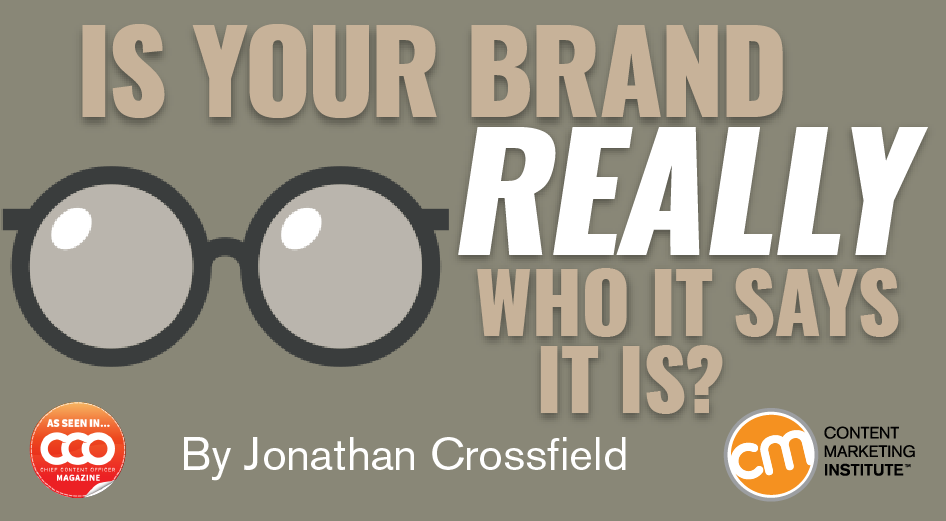Is Your Brand Really Who It Says It Is?. Welcome to the quagmire that is authenticity in social media. I’ve read a number of articles arguing that authenticity must be at the heart of any marketing strategy… while also insisting authenticity isn’t about being strategic. All of these discussions are really about how to appear authentic – how to create an artificial authenticity, if you will. I don’t just mean marketers and brands either. Does that mean everyone in social media is a hypocrite? In an agency, this may mean switching brand masks many times a day. The real people become buried and the result can be a public persona that feels more robotic – more contrived and less human. People want to believe the person giving them the advice isn’t just parroting a set of pre-approved responses that might not always fit the individual situation. Your social media team isn’t a chatbot.

According to the famous 1993 New Yorker cartoon, “On the internet, nobody knows you’re a dog.” Are any of us – brands and individuals alike – really who we say we are? Welcome to the quagmire that is authenticity in social media. Watch your step. It’s a minefield!
“Authenticity” has become one of those marketing buzzwords I love to hate, particularly when discussing social media marketing. Sure, authenticity inspires trust, and brands need to be trusted if their marketing is to be effective. But I do take a perverse pleasure in watching marketers tie themselves in knots trying to explain how authenticity is to be achieved.
I’ve read a number of articles arguing that authenticity must be at the heart of any marketing strategy… while also insisting authenticity isn’t about being strategic. Or that authenticity is not necessarily about being honest or transparent… but is absolutely about being genuine.
My favorite contradiction is that authenticity in marketing is about being more spontaneous, the clear opposite of calculated or strategic thinking. The moment you “plan” to be “spontaneous” is the moment the English language finally snaps under the weight of all that cognitive dissonance and retires to a remote island to reflect on where it all went so terribly wrong.
All of these discussions are really about how to appear authentic – how to create an artificial authenticity, if you will. (English language: “That’s it, I’m outta here!”)
To be truly authentic, your brand – and the people within it – would carry on without regard for whether its actions and messages are aligned with some stakeholder-approved, market-tested brand ideal. There would be no filter, no self-monitoring. Your social media team members would say what they really think, responding in the moment, instead of representing the brand’s more tempered, structured, and commercially sensitive views.
Of course, that’s impossible. It’s our job as marketers to guide perceptions, control the message, and create the best possible impression. So our approach to authenticity must sit somewhere between the genuine and the artificial, and that means first acknowledging the contradiction we’re struggling to resolve.
Strategy or no strategy, all social media is artifice and spin. I don’t just mean marketers and brands either. Every single one of us behaves inauthentically online.
The curated self
“What is drama but life with the dull bits cut out?” said Alfred Hitchcock to The Observer in 1960. Today, the same could be said of social media, as it allows us to conveniently omit and keep private the dull or less flattering bits of our own lives so that our friends and followers only get to see a more dramatic, more sensational, more preferable version of us. From the news stories and opinions we share, to the photos we make public, we choose exactly what the world will see of us and what will be kept private.
Sometimes it can be quite intimidating to scroll through my feeds and see all of these smart, hardworking, talented, fit, and extremely photogenic people leading lives that always seem far more interesting and gosh-darned successful than my own.
When Terry proudly shares his beautifully presented dinner, with the obligatory glass of red held up just in shot and accompanied by a smug “bon appétit,” I’m forced to look down at my beans on toast and glass of milk, and berate myself for not making more of a culinary effort. When Angela shares her new personal best time from the morning run with stats uploaded from her Fitbit, she puts my daily fitness routine of walking to the mailbox to shame.
Yet we never get to see the chaos in Terry’s kitchen, including the three failed attempts to get that soufflé to rise, nor do we see Angela’s afternoon chocolate binge that undid all of her hard work.
(FYI: Terry and Angela are fictional but – be honest – we all know Terry and Angela.)
Of course they don’t share these other…

COMMENTS